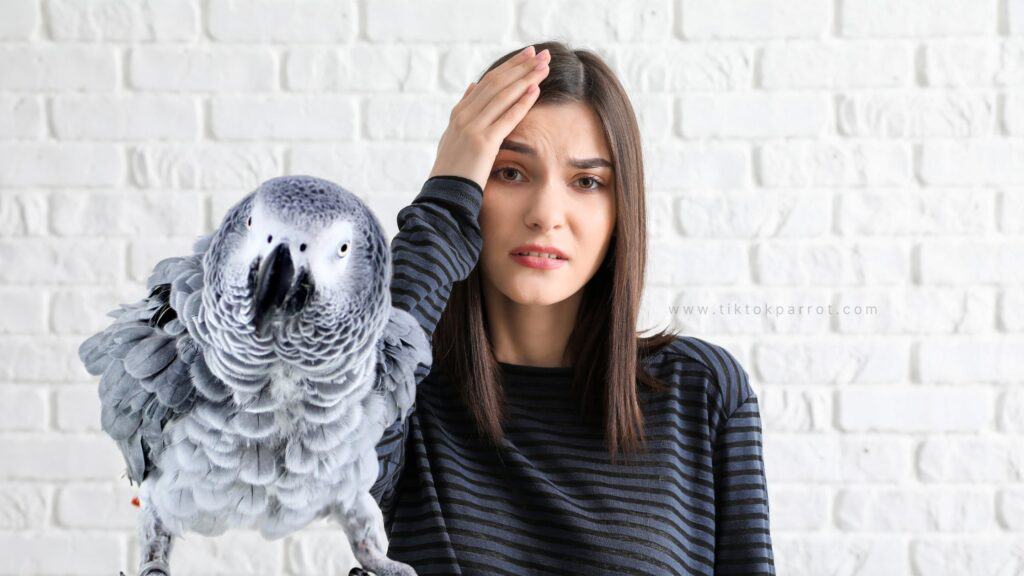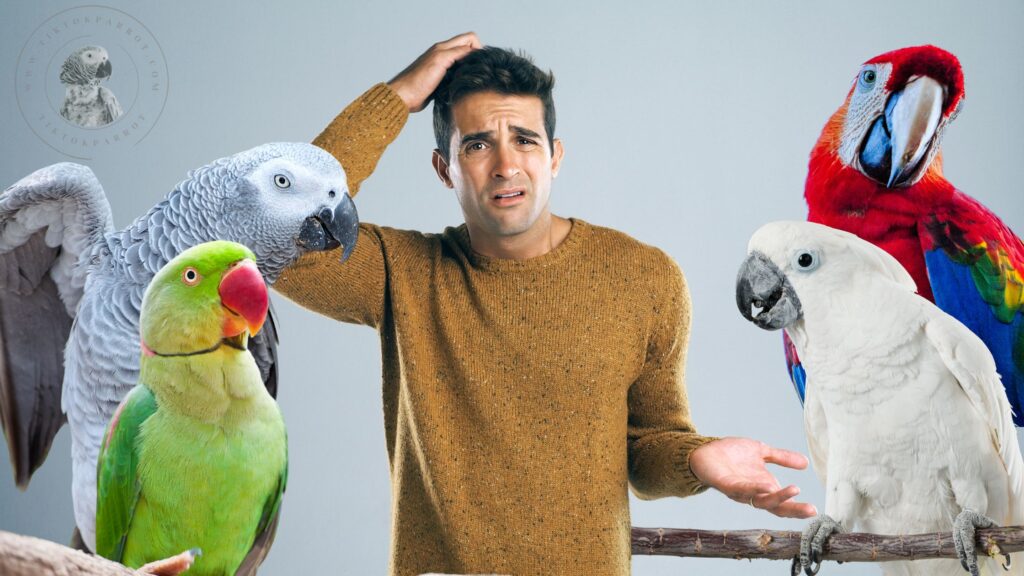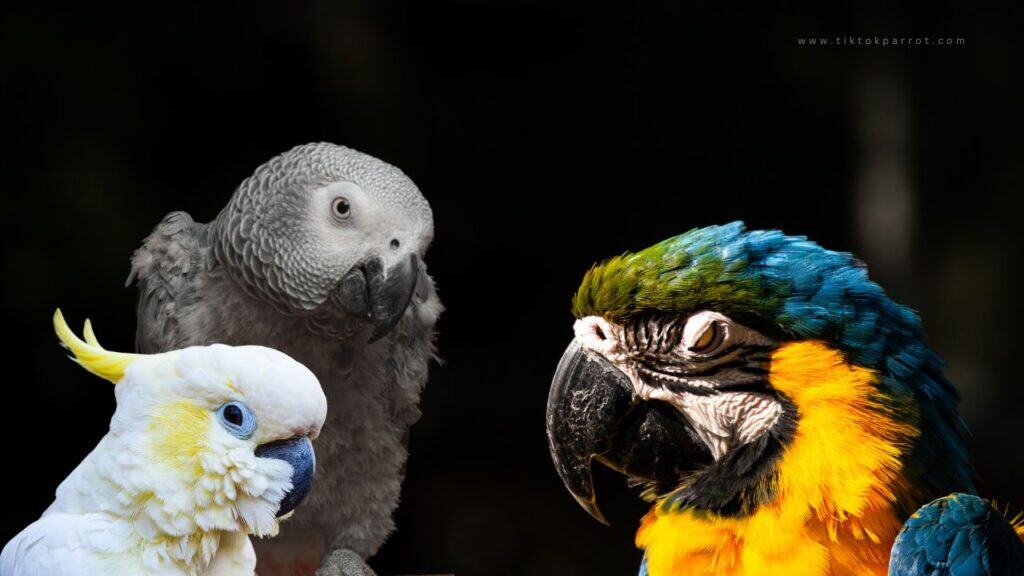Alright, bird lovers, let’s get real for a second: parrot diarrhea is not exactly a glamorous topic, but it’s something every parrot parent may have to deal with at some point. Parrots, like us humans, can sometimes have an upset stomach, and the results can be… well, let’s say less than ideal. But don’t worry, understanding parrot diarrhea isn’t rocket science, and I’m here to make it easy for you to handle.
Table of Contents
Learn all about parrot diarrhea—its causes, symptoms, and treatment options. Discover how to help your parrot recover quickly and stay healthy. Read below!
What is Parrot Diarrhea?

So, what is parrot diarrhea anyway? A parrot’s droppings are generally made up of three parts: feces (solid), urates (the white stuff), and urine (the watery part). Diarrhea in parrots occurs when the fecal component becomes abnormally watery and loose. It’s different from polyuria, which is when there’s an excess of urine.
If you notice watery droppings that often stick to the feathers around the vent area, you might be dealing with a case of parrot diarrhea.
Causes of Parrot Diarrhea
Let’s dive into what might be causing your feathered friend to have an upset tummy. Believe me, there are more culprits than you might think!
- Stress: Parrots are emotional little creatures. A change in environment, new household members, loud noises, or even something as simple as moving their cage can lead to stress, which can in turn lead to diarrhea. Think of it like how some of us get a nervous stomach before a big presentation—parrots can be the same way!
- Dietary Issues: This is probably the most common cause. Poor quality food, spoiled food, or even sudden changes in diet can wreak havoc on your parrot’s digestive system. Imagine switching from pizza to a salad-only diet overnight—yeah, your stomach would probably revolt too. Parrots can also be sensitive to foods that are high in sugar or fat, and spoiled food is a huge no-no.
- Infections: Bacterial, viral, or fungal infections can cause diarrhea. Think of them as those unwanted party crashers that mess everything up. These infections can disrupt your parrot’s intestinal tract, leading to symptoms like loose droppings. If there are other signs like lethargy or vomiting, this could be the reason.
- Internal Parasites: Gross, but true. Internal parasites like worms can lead to diarrhea. If your parrot’s tummy trouble is sticking around, these pesky critters could be to blame.
- Toxin Exposure: Birds are surprisingly sensitive to toxins. Household items like cleaning products, plants, or even certain metals could potentially cause diarrhea if your parrot ingests or inhales them. It’s like that time you accidentally drank spoiled milk—just a lot worse.
- Liver or Pancreas Issues: Inflammation of the liver or pancreas can also be a factor. If your parrot’s diarrhea is persistent and not resolving, it could indicate a more serious underlying condition.
Symptoms to Watch For

Besides watery poop, what else should you be looking for? Here are some common signs that something isn’t quite right:
- General Tiredness: If your usually chatty parrot is sitting fluffed up and quiet, that’s a red flag.
- Ruffled or Unkempt Feathers: Healthy parrots preen themselves regularly. If yours looks like it’s been through a wind tunnel, they might not be feeling their best.
- Loss of Appetite: If Polly doesn’t want a cracker—or anything else—pay attention.
- Vomiting: Not to be confused with regurgitation (which is often a sign of affection). Vomiting means something is wrong.
- Blood in Droppings: This could be dark green or black—definitely a reason to call your vet ASAP.
Action Steps for Parrot Owners
Alright, so your parrot’s poop looks like it’s seen better days. What now?
- Monitor Droppings: Keep an eye on consistency and color. Yes, it’s a bit gross, but it’s important.
- Look for Other Symptoms: If they seem off, tired, or show any of the other symptoms we talked about, take note.
- Consult a Vet: If things aren’t improving after 24 hours, it’s time to make that call. Don’t wait too long, as parrots can deteriorate quickly when they’re sick.
Veterinary Diagnosis and Treatment
If you end up at the vet (good call, by the way), they’ll probably ask you about your parrot’s diet, behavior, and any recent changes at home. They might also do some tests, like:
- Complete Blood Count (CBC): Helps to figure out if there’s an infection.
- Endoscopy: Sometimes they’ll need to look inside. Not pleasant, but necessary.
- Serum Biochemistry Panel: To check organ function.
- Radiograph (X-ray): To see if there’s something abnormal going on internally.
Treatment will vary depending on what’s causing the problem. It could involve:
- Antibiotics or Antifungals: If an infection is to blame.
- Surgery: For obstructions or more serious issues.
- Medications: To help calm an irritated gut.
Home Care After the Vet Visit
Your feathered friend is back from the vet, but the work isn’t done yet. Here’s how to help them get back to their chatty selves:
- Dietary Adjustments: Stick to pellets and fresh water until things settle down. Avoid anything too fancy or rich—think of it like the bird version of plain toast when we’re sick.
- Monitor Droppings: Keep an eye on how things are progressing. The goal is for those droppings to firm back up.
- Clean Environment: Hygiene is key! Clean the cage often and replace cage liners daily.
- Comfort: Keep your parrot in a warm, well-ventilated area. No drafts—they’re not fans of sudden chills.
While it’s not usually a big problem if your parrot has diarrhea once in a while, it’s definitely cause for concern if it lasts more than a day or keeps coming back. If other symptoms show up, take it seriously and consult your vet.
My final words
I would say parrot diarrhea might not be the most glamorous topic, but it’s something every parrot owner should know about. It could be as simple as a dietary issue or a sign of something more serious, and quick action is always better.
Keeping a close watch on your parrot’s health, providing them with a clean, comfortable environment, and knowing when to involve the vet can make all the difference in keeping Polly happy and healthy.
Got any experiences with a sick parrot or some extra tips to share? I’d love to hear about them in the comments below—let’s help each other out!
If you liked this blog, please share it with your family and friends who might also find it helpful. If you love African Greys, join our community of Grey owners! You can meet other owners, share tips and learn from each other.
Stay safe and much love!



